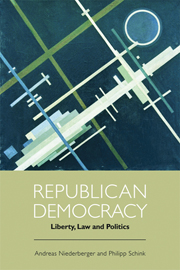Book contents
- Frontmatter
- Contents
- List of contributors
- Introduction
- 1 The Tension between Law and Politics in the Modern Republican Tradition
- 2 Impotence, Perspicuity and the Rule of Law: James Madison's Critique of Republican Legislation
- 3 Kant, Madison and the Problem of Transnational Order: Popular Sovereignty in Multilevel Systems
- 4 Republicanism and Democracy
- 5 Two Views of the City: Republicanism and Law
- 6 A Kantian Republican Conception of Justice as Nondomination
- 7 Two Republican Traditions
- 8 Freedom, Control and the State
- 9 Legal Modes and Democratic Citizens in Republican Theory
- 10 Rights, Republicanism and Democracy
- 11 Republicanism and Global Justice: A Sketch
- 12 Republicanism and Transnational Democracy
- Index
11 - Republicanism and Global Justice: A Sketch
Published online by Cambridge University Press: 05 October 2013
- Frontmatter
- Contents
- List of contributors
- Introduction
- 1 The Tension between Law and Politics in the Modern Republican Tradition
- 2 Impotence, Perspicuity and the Rule of Law: James Madison's Critique of Republican Legislation
- 3 Kant, Madison and the Problem of Transnational Order: Popular Sovereignty in Multilevel Systems
- 4 Republicanism and Democracy
- 5 Two Views of the City: Republicanism and Law
- 6 A Kantian Republican Conception of Justice as Nondomination
- 7 Two Republican Traditions
- 8 Freedom, Control and the State
- 9 Legal Modes and Democratic Citizens in Republican Theory
- 10 Rights, Republicanism and Democracy
- 11 Republicanism and Global Justice: A Sketch
- 12 Republicanism and Transnational Democracy
- Index
Summary
Prima facie, republicanism has a blind spot about global justice. The republican tradition seems to have little to say about pressing international issues such as world poverty or global inequalities. According to the old, if apocryphal, adage: extra rempublicam nulla justitia (there is no justice outside the republic). Some may doubt that distributive justice (as opposed to freedom or citizenship) is the primary virtue of republican institutions; and at any rate most would agree that republican values have traditionally been realized in the polis not in the (oxymoronic) cosmopolis. In this paper, I sketch a republican account of global nondomination that suggests that duties of distributive justice are not necessarily bounded to the institutions of a single society. In particular, I argue that republicans have good reasons to seek to curb those global inequalities that underpin what I call capability-denying domination. Because my main purpose is to set out an agenda for research in a still largely unexplored area, I can only provide here a preliminary sketch of this republican argument for global justice. In fact, it is not part of my claim that republicanism offers a full, coherent account of global justice; nor that republicanism is a more attractive theory than existing liberal cosmopolitan theory. I merely attempt to conceptualize the distinctive features of a republican approach to global justice, leaving a full assessment of its merits for subsequent inquiry.
- Type
- Chapter
- Information
- Republican DemocracyLiberty, Law and Politics, pp. 276 - 301Publisher: Edinburgh University PressPrint publication year: 2013



